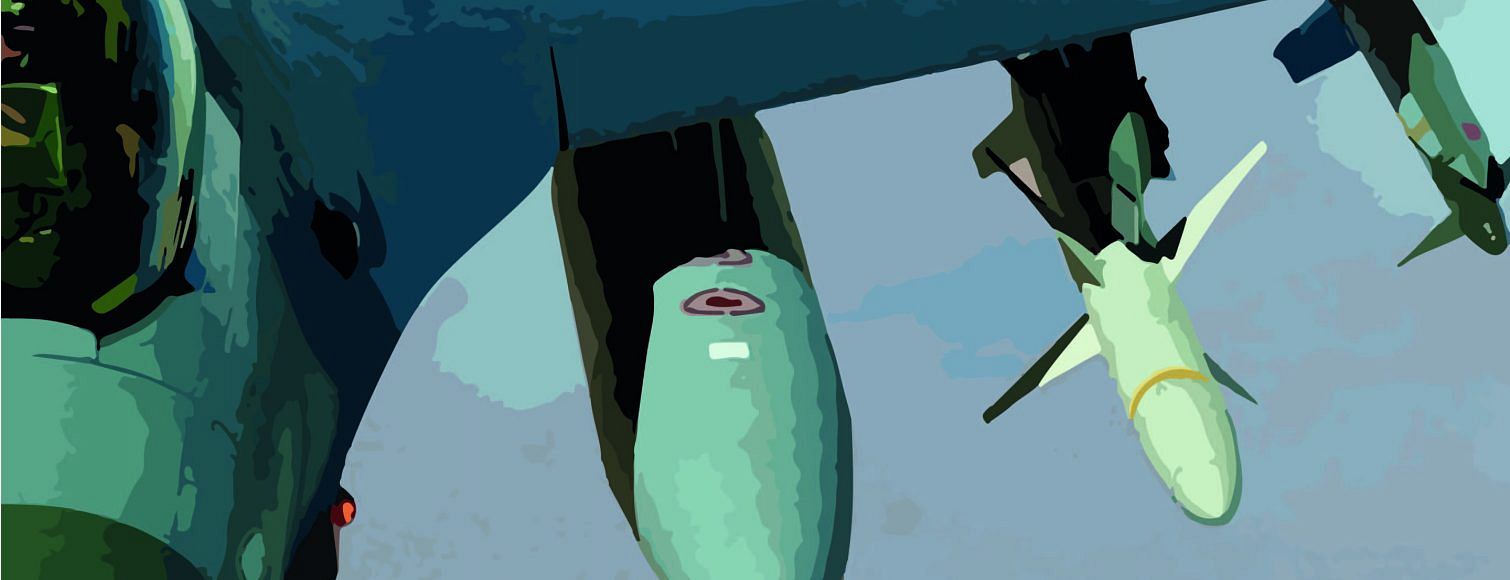Aerospace students often end up working in an industry with strong ties to military weapons research and manufacturing. Are they prepared for the difficult choices they might face? Would you be?
What about the role of TU Delft? Are there rules about working for the weapons industry? (Image: Studium Generale)
Last week, Studium Generale provided aerospace students with some food for thought about working in or close to military weapons research and manufacturing during their lunch debate ‘Weapons engineering and Aerospace’. Although TU Delft has no specific numbers on this, it is commonly accepted that the future employers of today’s aerospace students, namely large aerospace companies, often have military branches. But, are students aware of this?
Studium Generale invited four panellists to the discussion: an anti-weapons activist from outside TU Delft (Mark Akkerman), an assistant professor in flight mechanics and propulsion (Mark Voskuijl), a bachelor’s student at the Faculty of Aerospace Engineering (Yvonne Eggers) and an Aerospace master’s student with an internship at TNO designing smart bullets (Joost Broekhuizen).
Martial arts
The latter had difficulty finding a supervisor at TU Delft, he said. “Smart bullets make it possible to control the trajectory. That saves ammunition and reduces collateral damage. But professors didn’t want to touch this subject”, Broekhuizen said. That is why he ended up at TNO, a research institute with defence, safety and security as an important focus area.
A colleague of Broekhuizen at TNO later explained why he thinks weapons research is a good thing. “I practice martial arts. I train my body and so I know the devastation I can do if necessary. That makes me feel peaceful. With weapons it is the same. Society can’t not protect itself. I am willing to do the dirty work. There is no right and wrong here. But you do have to be able to reason the choices you make for yourself.”
Help
“The complexity is that you’ll never know how your research will be used”, one attendee said. “I am designing a space telescope for earth observation, because I like the engineering. But how and by whom will this telescope be used, who will it track? I can’t say. For myself I have decided that the benefits will outweigh the disadvantages.”
Apart from the conclusion that it was a complex subject, the other take away was summed up by Klaas van der Tempel of Studium Generale: “Students need help thinking about ethical dilemmas so that they can make the right choices for themselves.”
Several students in the audience laughed somewhat cynically when asked if the mandatory master’s course in ethics is sufficient. One attendee said, “The course in the masters programme is only there so that we can say that we covered ethics. That is not enough.”
No clear policy
So what about the role of TU Delft? Are there rules about working for the weapons industry? According to Mark Voskuijl there aren’t. “At TU Delft we try to improve welfare and the sustainability of society. We are involved, however, with companies that have a military branch. There is no clear policy on that apart from the rather vague code of ethics. I think that is wise, because we need academic freedom for researchers to decide for themselves if their work has academic relevance. Also keep in mind that many military inventions are later implemented in civil society, with positive effect.”
Activist Mark Akkerman, who researched the involvement of Dutch companies, government, and research institutes in the armed upheavals in Middle Eastern and North African countries and the ensuing stream of refugees, nevertheless said that in an ideal world TU Delft wouldn’t work with the weapons industry, including large aviation companies, at all. In a quick overview he showed that these companies benefit not only from war, but also from pressing politicians into securing the EU-borders against the refugee flows these wars induce. “I hope that this story discourages students,” he said.
The panel’s bachelor’s student Eggers suggested that that might not be the case for everyone. “Before this discussion I hadn’t really thought about this matter. But my first thought would have been not to get involved with companies with a military branch. Now I think it might actually be a good thing to be able to control weapons as in the case of smart bullets. If you decide that killing is necessary in a war, then better do it without hurting civilians. Although I still prefer to keep away from these kinds of decisions.”
There is more
If you still haven’t made up your mind, this week you can read an interview with the new dean of the Faculty of Aerospace Engineering, Henri Werij, on Delta, partly on this very issue.
Later this week Delta will ask ethics teacher Udo Pesch to explain how he helps students face complex ethical dilemmas.
Do you have a question or comment about this article?
s.m.bonger@tudelft.nl


Comments are closed.